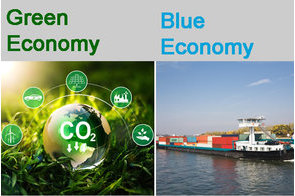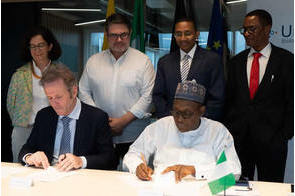Latest News
NDFF 2024 conference makes 15 recommendations for Nigeria's economy

News Highlight
Participants at the conference included cabinet ministers, regulators, policymakers, members of the diplomatic corps in Nigeria, public and private sector leaders, leaders of international institutions, social sector leaders, and the media.
Nigeria Development and Finance Forum (NDFF) 2024 Conference successfully held on 8 – 9 May 2024, at Transcorp Hilton, Abuja.
Participants at the highly impactful conference included cabinet ministers, regulators, policymakers, members of the diplomatic corps in Nigeria, public and private sector leaders, leaders of international institutions, social sector leaders, and the media.
The two-day conference had as its theme “The Road to Economic and Social Welfare Transformation” and featured six sessions: Fiscal Policy for Jobs and Shared Prosperity, Monetary Stability and Revitalising Industries and Markets, Health and Social Welfare Transformation, Nigerian Economic Sustainability, Industry-focused Session on the Nigerian Blue Economy, and Industry-focused Session on the Nigerian Green Economy.
The keynote speaker and high-level panellists at NDFF 2024 Conference included the Hon. Coordinating Minister of Health and Social Welfare, Prof. Muhammad Ali Pate; Hon. Minister of Industry, Trade and Investment, Dr. Doris Nkiruka Uzoka-Anite; Director General, National Agency for Food and Drug Administration and Control (NAFDAC), Prof. Moji Adeyeye; Senior Partner, Olisa Agbakoba Legal, Dr. Olisa Agbakoba, SAN; Director, Abuja School of Social and Political Thoughts, Dr. Sam Amadi; MD/CEO; Nigerian Export-Import Bank, Mr. Abba Bello; MD/CEO, Mediterranean Shipping Company (MSC) Nigeria, Mr. Andrew Lynch; Partner, Dentons ACAS Law, Mrs. Funke Agbor, SAN; Managing Partner, Foundation Chambers, Mr. Chidi Ilogu, SAN; Director General, National Council on Climate Change, Dr. Salisu Dahiru; Deputy Director (Africa Office), MacArthur Foundation, Dr. Amina Salihu; and Founder, Resolute 4.0, Mr. Rotimi Williams. A goodwill message of the conference was delivered by Acting High Commissioner/Chargé D'affaires, Canadian High Commission in Nigeria, Ms. Djifa Ahado.
The following resolutions and recommendations emerged from the proceedings of the conference:
1) Provision of palliatives to vulnerable citizens is necessary and important to cushion the impact of economic shocks. Demand for palliatives will remain because global economic shocks and shocks from local economic, social, and climate crises, which are no longer a rarity, are expected to continue to occur regularly. As such, it is important that the Nigerian government put in place frameworks to deliver palliatives in an efficient and cost-effective manner.
2) Policy must build resilience to crisis by improving the business environment, incentivising production, boosting industrial capacity, and bringing industrial production closer to the people. This will accelerate economic growth, generate employment, and result in shared prosperity.
3) Market reforms are important. But Nigerian institutions need to be rebuilt and equipped with the ethos and capacity to be values-driven, goal-oriented, and efficient. The country also needs a coherent economic development agenda to boost long-term investment confidence. The essential factors for achieving this are good governance and public sector managerial leadership skills, which are crucial for effective resource management, policy implementation, building trust, and promoting unity.
4) Investment in health and education is a critical determinant of sustainable and equitable socio-economic development. And each country has a health sector that reflects its level of investment in the sector. Regrettably, however, Nigeria’s investment in health and education has been lacklustre, resulting in poor development outcomes and insecurity. To correct course, the country must adopt people-centric approach to the governance of the health sector, begin to reindustrialise the sector to create jobs, and drive inclusive progress, as a means of fostering economic resilience and health security. The Federal Ministry of Health and Social Welfare is steering health policy in this direction.
5) The ruling elites need to agree and prioritise economic progress in the country. They can drive this goal by identifying and enabling the institutions that are critical to success. Success itself has to be progressively deepened. A good example of an institution that is driving incremental progress is the National Agency for Food and Drug Administration and Control (NAFDAC).
6) The role of government in economic development is expansive; it extends beyond “providing an enabling environment for business.” It extends to provision of financing to enable Nigerian big businesses to grow bigger and expand into foreign markets, and effective and adequate support for small businesses to thrive.
7) The country needs to focus on driving ‘holistic’ sustainability, which entails the fostering of economic growth, development, and transformation; institutional virility and performance; social equity; and environmental responsibility. Deliberate efforts should also be made to future-proof the economy by fostering progress and preventing retrogression.
8) Buying made-in-Nigeria is vital for growing and developing the local economy. It must be part and parcel of the civic duty of all Nigerians. Government officials must go beyond the talk or simply making local content legislation; they need to match practice with policy by showing preference for Nigerian products and services. Like the Fly America Act stipulates, Nigerian public functionaries must fly Nigerian carriers for official international travels.
9) Gender stereotypes and discrimination against women have contributed to lack of support for and recognition of women, many of whom are operators of nano, micro, small, and medium-sized businesses. Implementing policies to promote gender equality, increasing access to opportunities for women, tackling gender stereotypes and biases, and fostering inclusive workplace cultures are necessary for economic and social transformation in Nigeria.
10) Nigeria has abundant opportunities for economic growth in the blue economy, including fisheries, tourism, transportation, and the prospect of being a regional hub in West Africa. These potentials have been with us for years. But despite the potentials, the ports in neighbouring Benin and Togo have continued to serve the Nigerian markets, and Ghana’s Port of Tema is bigger than any Nigerian port.
11) While we welcome the policy emphasis that has led to the creation of the Federal Ministry of Marine and Blue Economy, deliberate actions are necessary to incentivise and promote investment in the sector. Bureaucratic delays to securing project approvals, lack of regulatory transparency, and inter-agency rivalry instead of coordination have to be addressed. Bureaucratic red tape increases the cost of projects where it didn’t outrightly discourage investment.
12) Climate change is not just a theory. Its impacts in Nigeria are practical and felt through irregular weather patterns, extreme weather events like flooding and excessive heat, receding surface water, etc. Conflicts induced by climate change in Nigeria are exacerbating insecurity, which is affecting agriculture and driving food insecurity. A critical driver of herders-farmers clashes is lack of resettlement of displaced herder communities following the urbanisation in and around the Federal Capital Territory and other developments around the country that have taken over traditional grazing routes.
13) Extensive mitigation and adaptation actions and market frameworks are needed to address climate vulnerabilities in Nigeria. These include public investment, including in ranching – beginning with communities that welcome such investment – education and health services for herders, and proactive engagement.
14) Public, private, and international sectors institutions should support the development of innovative regulatory, market, and financing frameworks, including green bonds, sustainability-linked loans and bonds, carbon pricing, among others, to support green economic growth in Nigeria.
15) NDFF conference provides a platform for intellectual and practical discourse and high-level networking. It provides useful interface for leaders in the public, private, social, and international sectors to generate ideas for inclusive reform process, boost cooperation, and drive investment, all geared towards achieving sustainable economic progress in Nigeria.
Related News
Latest Blogs
- The Museum of West African Art saga
- The complexity and complication of Nigeria’s insecurity
- Between bold is wise and wise is bold
- Prospects of port community system in Nigeria’s maritime sector
- Constitutionalism must anchor discipline in Nigerian Armed Forces
Most Popular News
- NDIC pledges support towards financial system stability
- Artificial intelligence can help to reduce youth unemployment in Africa – ...
- ChatGPT is now the most-downloaded app – report
- Green economy to surpass $7 trillion in annual value by 2030 – WEF
- Africa needs €240 billion in factoring volumes for SME-led transformation
- CBN licences 82 bureaux de change under revised guidelines






